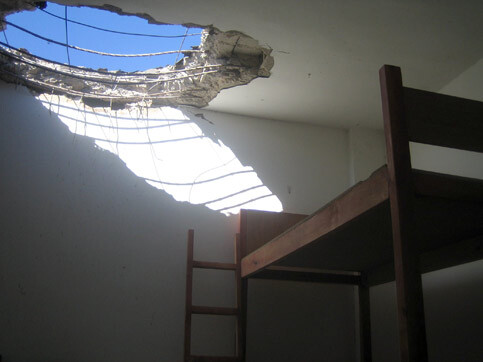IRIN 4 September 2006

A private Bint Jbeil hospital suffered partial damage from Israeli bombing. (Serene Assir/IRIN)
BINT JBEIL/TYRE - In spite of damage caused to Lebanon’s health sector by a 34-day war between Israel and Hezbollah, its primary health care sector is coping, according to aid agencies.
“People now have access to primary health services in most affected areas,” said Dr Sarmad Suleiman, World Health Organisation (WHO) team leader in Tyre, 80 km south of the capital Beirut.
With a United Nations-brokered ceasefire in place since 14 August, humanitarian assistance from the Lebanese government and international aid agencies has been reaching the majority of areas most affected by the conflict with vastly greater ease.
“When we first arrived, we were impressed to find that the situation was better than we had expected,” said Tony Taylor, WHO logistics officer in Tyre.
Though an Israeli imposed air and naval blockade is still in place, ships laden with relief supplies are being granted permission to dock. Supplies that were in severe shortage during the conflict are now available.
“The health ministry is filled with drugs and supplies,” said Suleiman.
A health facilities damage assessment conducted by the WHO and Lebanon’s Ministry of Health concluded on 1 September that 25 percent of health facilities in the worst hit areas of south Lebanon are not functioning, as 4 percent are totally destroyed and 9 percent severely damaged.
However, the WHO found that basic medical needs are being met in Lebanon and that no outbreaks of diseases have been reported.
Apart from ongoing power shortages, hospitals have survived the conflict relatively unscathed. There are 44 private and 11 public hospitals in Lebanon. Some in the south and east of the country were damaged by Israeli air strikes in their vicinity, but there were no direct hits.
“No hospital was totally destroyed,” said Dr Abdullah Al-Ajouz, a health ministry official. “Some suffered partial damage.”
According to the Lebanese government’s ‘national early recovery process’ report, which was presented at a donors’ conference in Stockholm on 31 August, initial damage assessments for five government hospitals in south Lebanon and the eastern Beqaa Valley are estimated at US $34 million.
Areas near the southern border with Israel that continue to be occupied by the Israeli army remain, nonetheless, inaccessible even for basic humanitarian aid.
Bint Jbeil, a town about 100 km south of Beirut, saw some of the heaviest bombing and fighting during the war. Its only functioning hospital was damaged when a rocket tore through the roof of a ward.
“A woman was sleeping inside when the ceiling collapsed on her,” said Yousef Hammoud, a nurse at the hospital, which is run by the Islamic Health Organisation charity. “She was killed.”
Despite this, the hospital never closed. “Our doors were open to receive the injured throughout the war,” said Hammoud.
While south Lebanon’s hospitals have stood their ground structurally and are well stocked with medicinal supplies, lack of equipment remains a problem.
“Many of our machines have become dysfunctional, either because the pressure from nearby explosions ruined them or because proper maintenance during the war was not possible,” said Hammoud. In addition, phone lines damaged by the bombings have prevented people in the vicinity from being able to call the hospital to report emergencies.
However, Al-Ajouz said that when one hospital or clinic is not well enough equipped to treat a given patient, he or she is promptly transferred. “The biggest indication that the primary health sector is indeed coping is the fact that we now have more than 4,000 injured from the war, and not one of them has had to be transferred abroad for treatment,” he said.
This item comes to you via IRIN, a UN humanitarian news and information service, but may not necessarily reflect the views of the United Nations or its agencies. All IRIN material may be reposted or reprinted free-of-charge; refer to the copyright page for conditions of use. IRIN is a project of the UN Office for the Coordination of Humanitarian Affairs.
Related Links